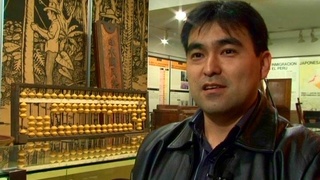Interviews
Thoughts on the term, "Nikkei"
What does Nikkei mean to me? It means an American of Japanese ancestry. Not necessarily… So then am I Japanese or am I an American when they say “Japanese American?” Japanese American National Museum. That’s interesting. I was born an American citizen. Grew up on the so-called Westside of Los Angeles, not the new Westside but the old Westside. Predominantly ethnic neighborhood. Hamburgers, hot dogs, burritos, collard greens, rice everyday growing up. All those things. Japanese language school. To me that’s all Nikkei. The language, the food, the broken Japanese, understanding what it is, the evolvement of Japanese words in American society and stuff. So all those different kinds of things are Nikkei.
So I never use the word, or it doesn’t come out of my mouth very freely in terms of using the word, “Nikkei.” I’m not sure, but I think the term Nikkei, I think I saw it within the context of the JACL. It was not necessarily brought up as much or talked about or used as much in the other Japanese American organization, religious organizations—whether it be in the Buddhist organizations or the Christian organizations. They may have used it. But for us, I didn’t necessarily use the word “Nikkei” as much. I just didn’t. I guess the Japanese would call us more Nikkei than I would call myself a Nikkei.
Date: October 15, 2004
Location: California, US
Interviewer: Art Hansen, Sojin Kim
Contributed by: Watase Media Arts Center, Japanese American National Museum
Explore More Videos

Diverse membership in San Jose Taiko
Co-founder and creative director of San Jose Taiko

Looking at your country from the outside
(b.1942) Japanese American ceramist, who has lived in Japan for over 30 years.

Wife's family in Japan
(b.1942) Japanese American ceramist, who has lived in Japan for over 30 years.

Lack of notion of citizenship in Japan
(b.1935) American born Japanese. Retired businessman.

Generational Change (Spanish)
(b. 1974) Director of Ryukyu Matsuri Daiko in Peru

Lack of language skills
(b.1964) California-born business woman in Japan. A successor of her late grandmother, who started a beauty business in Japan.

Preserving traditional Japanese culture
(b.1964) California-born business woman in Japan. A successor of her late grandmother, who started a beauty business in Japan.

Having patience in Japan, being both
(b.1964) California-born business woman in Japan. A successor of her late grandmother, who started a beauty business in Japan.


Being on the outside
(b.1948) Nikkei from Southern California living in Japan.

His parents' experience with Japanese resistance toward intermarriage with Okinawans
(b.1925) Nisei of Okinawan descent. Had a 38-year career in Japan as a baseball player, coach, scout, and manager.

Working in cane fields as teenager, and how it helped in his athletic training (Japanese)
(b.1925) Nisei of Okinawan descent. Had a 38-year career in Japan as a baseball player, coach, scout, and manager.

Nickname
(b.1913) Kibei from California who served in the MIS with Merrill’s Marauders during WWII.

Mixed emotions after declaration of war on Japan
(b.1913) Kibei from California who served in the MIS with Merrill’s Marauders during WWII.

Growing up in Waikiki
(b. 1924) Political scientist, educator, and administrator from Hawai`i
